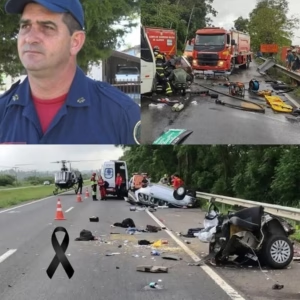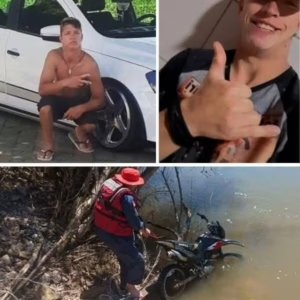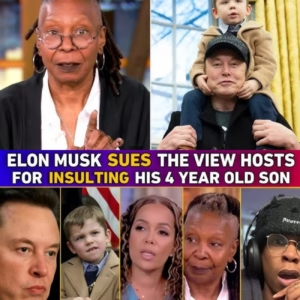It started like any other Tuesday — same routine, same quiet suburban calm. The kids were at school, my wife was working from the kitchen, and I was half-watching the news when the doorbell rang. It was our regular delivery guy, Ravi. He’s been dropping off food at our place for almost two years — always polite, always smiling, the kind of person who brightens your day with a “Hey boss, how’s it going?” before jogging back to his bike.
But that day was different. He looked tense — distracted, almost paranoid. His usual smile never showed. He handed me the paper bag, nodded, and left without a word. Before I could even ask if he was okay, he was gone.
It wasn’t until I brought the food to the counter that I noticed it. On the side of the bag, just under the logo, was a short note written in messy blue ink: “CHECK YOUR TRASH CAN.”
At first, I thought it was a mistake. Maybe he’d mixed up orders, or it was some kind of weird joke. But something about his expression — that tight, haunted look — kept replaying in my head. I went out to the backyard, still holding the note, and stared at the trash bins lined up by the fence.
When I lifted the lid, my stomach turned.
Inside the bin, buried beneath a layer of old newspapers, were tools — not random junk, but specific, deliberate items: a crowbar, a screwdriver, a set of bolt cutters, and a small canister of clear liquid with no label. The smell was sharp, chemical, industrial. I knew enough to recognize trouble. Whoever had been in my yard wasn’t dumping garbage — they were preparing for something.
I called the police immediately.
Within minutes, two patrol cars pulled up. Officers swept the area, taking photos and bagging the evidence. One of them, a veteran named Alvarez, crouched by the bin and shook his head. “That chemical?” he said. “It’s a solvent we’ve seen before. Criminals use it to weaken locks — eats through metal over time.” He looked up at me. “You’re lucky someone tipped you off.”
Lucky. That word hit differently that night.
Turns out, our neighborhood had been hit by a string of break-ins over the last three weeks. Same pattern every time — homes with predictable schedules, backyards facing alleys, and security systems that hadn’t been updated in years. The burglars were organized and careful, leaving little behind. The police had no solid leads.
But someone — maybe Ravi — had seen something.
I tried calling the restaurant he worked for, but they said he’d taken time off “for personal reasons.” That only made the situation feel stranger. How did he know to warn me? Was he involved somehow, or had he overheard something that made him risk his job — maybe even his safety — to tip me off?
That night, I barely slept. Every creak of the house sounded like a footstep. Every shadow near the window made me tense. My wife tried to stay calm, but I could see the fear in her eyes too. It wasn’t just about the break-in — it was the idea that someone had been close enough to plan it. Someone had studied our home, our habits, our routines. We weren’t paranoid anymore. We were a target.
By morning, I’d made a decision. Enough was enough.
I called a security company and booked a full installation — motion sensors, reinforced doors, and a camera system that covered every angle of our property. Within a week, we had 24/7 surveillance streaming straight to our phones. The first night I watched the live feed, I felt a strange mix of relief and sadness. Relief because I finally felt safe again. Sadness because I realized how naive I’d been — assuming bad things only happen to other people.
Two days later, the police came back with news. The tools in the trash had fingerprints, though they were partial. They matched similar ones from another house two streets over that had been broken into a week earlier. Whoever was behind this wasn’t just prowling randomly — they were building a list. And my house was next.
The detective who briefed me looked serious. “If your delivery guy hadn’t warned you,” he said, “they probably would’ve hit your place that same night. You owe him more than you think.”
I tried again to find Ravi. No luck. His phone was disconnected, and the restaurant manager claimed he hadn’t heard from him in days. It was as if he’d vanished. Maybe he was scared. Maybe he’d overheard something he wasn’t supposed to. I kept imagining him noticing something suspicious — maybe a car that didn’t belong, a stranger watching our house, or a conversation he couldn’t ignore.
A week passed, then two. The break-ins stopped. The neighborhood quieted down, but none of us relaxed. We held a community meeting, set up a group chat, and started a nightly patrol rotation. It’s funny how fear can bring people together. Neighbors who’d barely nodded at each other for years were suddenly checking in, sharing coffee, swapping stories about security cameras and deadbolt locks.
As for us, life slowly began to feel normal again — at least on the surface. But I still check those cameras every night before bed. I still double-lock the doors. And every time a delivery driver comes up the walk, I catch myself glancing at the bag, half-expecting another note.
Last week, a letter arrived with no return address. Inside was a simple message written on lined paper: “Glad you’re all safe. Didn’t want to scare you — just couldn’t let it happen. Take care, Ravi.”
That’s it. No explanation, no signature, just that quiet reassurance. I read it three times, then folded it carefully and tucked it into a drawer.
I’ll probably never know exactly what happened — whether Ravi stumbled onto something criminal, whether he was being watched, or whether he risked his job because his conscience wouldn’t let him stay silent. But I know this: his warning changed everything. It saved my home, maybe even my family’s lives.
Now, when I look at those cameras glowing softly in the dark, I don’t see paranoia. I see gratitude — for a stranger who cared enough to act, and for the reminder that sometimes, the smallest gestures can mean the difference between danger and safety.
People talk about heroes like they’re caped and loud. But sometimes, heroism looks like a quiet man dropping off dinner, slipping a note onto a bag, and disappearing into the night — leaving behind nothing but a message that saved a life.
And I’ll never forget him for it.





